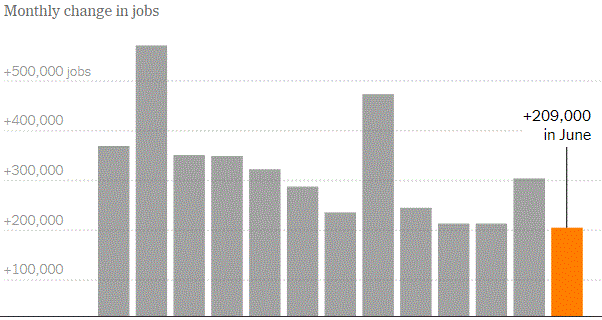MarketWatch
The numbers: The U.S. created 209,000 new jobs in June to mark the smallest increase in more than two and a half years, perhaps a sign the labor market is cooling off as rising interest rates gradually weaken the economy.
Hiring in May and April were not as strong as originally reported, either.
Economists had forecast a 240,000 increase in new jobs, according to a Wall Street Journal survey.
The unemployment rate dipped to 3.6% from 3.7%, the government said Friday.
The softer employment report could mollify senior officials at the Federal Reserve, who want hiring and economic growth to slow to help them bring down high inflation.
Yet it might not be enough to forestall a further increase in interest rates, especially with wages rising rapidly and adding to inflationary pressures.
Hourly pay rose a sharp 0.4% in June — higher than expected — and left the increase over the past year at 4.4%. Wages were rising less than 3% a year before the pandemic.
The Fed is widely expected to raise rates later this month as it seeks to restore inflation to pre-pandemic levels of 2% or less. Inflation has been stuck in the 4% to 5% range.
Higher borrowing costs reduce inflation by slowing the economy, but they also raise the risk of recession.
Big picture: The economy has been defying expectations and still appears to be expanding at a brisk pace.
The bad news? The Fed is primed to keep raising rates until the economy slows even further and the central bank is convinced high inflation is going away. It’s going to take a few more jobs reports showing a further slowdown in hiring to persuade the Fed.










